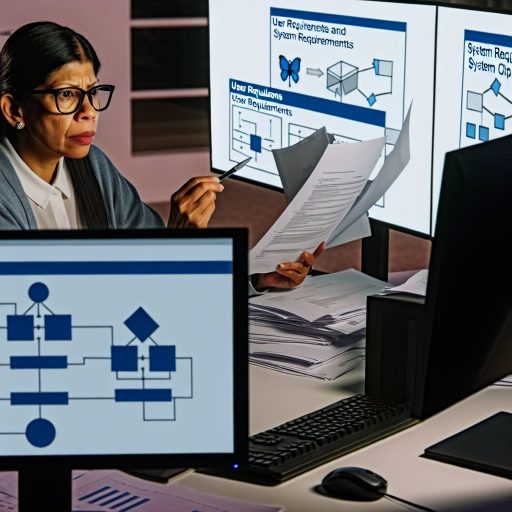Introduction
In the world of cybersecurity, Information Security Analysts play a crucial role in protecting organizations from cyber threats.
They are responsible for analyzing the security measures in place, identifying vulnerabilities, and implementing new strategies to safeguard valuable data.
Brief Overview of the Role of an Information Security Analyst
Information Security Analysts are tasked with protecting an organization’s computer systems and networks from cyber attacks, data breaches, and other security incidents.
They work diligently to ensure that sensitive information remains secure and confidential.
Importance of Ethical Guidelines in the Field of Information Security
Ethical guidelines are essential in the field of information security as they help professionals maintain integrity, trust, and credibility.
Adhering to ethical standards ensures that Information Security Analysts act in the best interest of their clients and uphold the principles of confidentiality, honesty, and responsibility.
In addition, following ethical guidelines helps prevent conflicts of interest, promotes transparency, and fosters a culture of respect within the cybersecurity community.
By prioritizing ethics, Information Security Analysts can build trust with clients, stakeholders, and the public, ultimately enhancing the overall security posture of organizations.
Definition of ethical guidelines for Information Security Analysts
Ethical guidelines for Information Security Analysts are rules and principles that govern their conduct.
These guidelines ensure that analysts adhere to moral and professional standards in their work.
They help maintain the confidentiality, integrity, and availability of sensitive information.
Explanation of the principles and values that guide ethical behavior in this role
- Integrity: Analysts must act honestly and transparently in all their dealings.
- Confidentiality: They must protect sensitive data from unauthorized access or disclosure.
- Objectivity: Analysts should provide unbiased and impartial assessments of security risks.
- Professionalism: They must conduct themselves in a competent and responsible manner.
Importance of following ethical guidelines in maintaining trust and credibility
- Following ethical guidelines builds trust with stakeholders and clients.
- It helps ensure that analysts are reliable and competent in their roles.
- Adhering to ethical principles enhances the credibility of security assessments.
- Violation of ethical guidelines can damage an analyst’s reputation and undermine trust.
Responsibilities of Information Security Analysts in regards to ethical guidelines
Information Security Analysts play a crucial role in safeguarding sensitive information.
Ensuring the security and confidentiality of sensitive information
Information Security Analysts are responsible for implementing security measures to protect sensitive data from unauthorized access.
They must carefully assess and identify potential vulnerabilities in the organization’s systems and networks.
By implementing encryption techniques and access controls, they ensure that sensitive information is protected from unauthorized disclosure.
Regular monitoring and auditing of systems help in detecting any unauthorized access or security breaches in a timely manner.
Reporting any unethical behavior or security breaches
Information Security Analysts have a duty to report any suspected unethical behavior or security breaches to the appropriate authorities.
They must maintain open communication with management and stakeholders to ensure transparency in reporting such incidents.
Reporting security breaches promptly can help in containing the impact and preventing further damage to the organization.
By following established reporting procedures, Information Security Analysts contribute to maintaining the integrity and reputation of the organization.
Transform Your Career Today
Unlock a personalized career strategy that drives real results. Get tailored advice and a roadmap designed just for you.
Start NowLearn More: Guide to Virtualization for Systems Administrators
Case studies highlighting the importance of ethical guidelines in Information Security Analysts’ work
Example 1: Target Breach – In 2013, hackers stole credit card information from 40 million customers due to poor ethical practices.
Example 2: Equifax Data Breach – In 2017, over 143 million people were affected due to negligence in security protocols.
Example 3: Yahoo Hack – In 2014, hackers gained access to 500 million accounts, leading to a major breach.
Examples of companies that have faced security breaches due to lack of adherence to ethical guidelines
- Sony Pictures – In 2014, a cyber-attack leaked sensitive data and caused reputational damage.
- Facebook – In 2018, the Cambridge Analytica scandal revealed unethical data practices compromising user privacy.
- Anthem Inc. – In 2015, a breach exposed 78.8 million customer records due to insufficient security measures.
Impact of unethical behavior on individuals, organizations, and society as a whole
- Individuals – Loss of personal data can lead to identity theft, financial loss, and emotional distress.
- Organizations – Damage to reputation, financial loss due to lawsuits, and loss of customer trust.
- Society – Loss of confidence in digital platforms, erosion of privacy rights, and increased cyber threats.
Uncover the Details: Developing Soft Skills as a Virtualization Engineer
Training and Education for Information Security Analysts on Ethical Guidelines
Information Security Analysts play a crucial role in protecting sensitive data and systems from cyber threats.
It is essential that these professionals receive proper training and education on ethical guidelines to ensure that they operate with integrity and adhere to industry standards.
Here are some key points to consider when it comes to training and education for Information Security Analysts on ethical guidelines:
Importance of Ongoing Professional Development
Continuous learning is vital for Information Security Analysts to stay current with evolving threats and technologies.
By participating in ongoing professional development, analysts can enhance their skills and knowledge to effectively address cybersecurity challenges.
Staying Updated on Industry Best Practices
Information security practices are constantly evolving, and it is crucial for analysts to stay updated on industry best practices.
By staying informed about the latest trends and techniques, analysts can better protect their organizations from cyber threats.
Resources and Organizations Providing Training on Ethical Guidelines in Information Security
There are several resources and organizations that provide training on ethical guidelines in information security.
These resources offer valuable insights and guidance to help Information Security Analysts navigate complex ethical issues in their work:
EC-Council
EC-Council is a leading provider of certification programs in information security, including training on ethical hacking and cybersecurity governance.
Their courses help Information Security Analysts gain the skills and knowledge needed to uphold ethical standards in their work.
(ISC)²
(ISC)² is a global nonprofit organization that offers certifications in information security, such as the Certified Information Systems Security Professional (CISSP) certification.
This certification emphasizes ethical practices and provides guidance on ethical decision-making for Information Security Analysts.
ISACA
ISACA is a professional association that focuses on IT governance, risk management, and cybersecurity.
Showcase Your Business Today
Reach thousands of readers actively exploring professional services. Publish your business profile and grow your audience now.
Publish NowThey offer training programs and certifications, such as the Certified Information Security Manager (CISM) certification, which emphasizes ethical conduct and compliance with industry standards.
By utilizing these resources and organizations, Information Security Analysts can enhance their understanding of ethical guidelines and best practices in information security.
Continuous learning and professional development are essential for ensuring that analysts uphold ethical standards and protect their organizations from cyber threats.
See Related Content: IT Security Manager vs. CISO: Key Differences

Challenges Faced by Information Security Analysts in Following Ethical Guidelines
Adhering to strict ethical guidelines while ensuring security measures are robust.
Resisting the temptation to prioritize convenience over security.
Handling conflicts of interest that may arise between ethical obligations and business needs.
Keeping up with constantly evolving cybersecurity threats and best practices.
Balancing the need for transparency with the need to protect sensitive information.
Balancing the Need for Security with Respect for Privacy Rights
Weighing the importance of protecting data against respecting individuals’ right to privacy.
Finding solutions that adequately secure systems without intruding on users’ privacy.
Educating stakeholders on the importance of balancing security measures with privacy rights.
Regularly reviewing and updating policies to ensure they align with ethical guidelines.
Implementing encryption and access controls to strike the right balance between security and privacy.
Dealing with Pressure from Employers or Clients to Cut Corners on Security Measures
Communicating effectively with management about the risks involved in compromising security.
Providing evidence-based arguments for why shortcuts in security are not advisable.
Advocating for ethical practices and explaining the potential consequences of unethical behavior.
Offering alternative solutions that uphold ethical guidelines without sacrificing security.
Seeking support from industry associations or regulatory bodies to reinforce the importance of ethical conduct.
Learn More: ERP Consultant Success Stories
Strategies for Information Security Analysts to uphold ethical guidelines
Developing a strong ethical framework is crucial for Information Security Analysts.
It involves creating a personal code of conduct to guide decision-making.
This framework should align with industry standards and best practices.
Seeking support and guidance from mentors is also beneficial in upholding ethics.
Mentors can provide valuable insights and advice on ethical dilemmas.
Professional organizations offer resources and networking opportunities for ethical concerns.
Collaborating with industry peers can help in navigating complex ethical issues.
Staying informed about ethical guidelines and regulations is essential for analysts.
Continuously educating oneself on ethical considerations is key to ethical decision-making.
Regularly reviewing and updating personal ethical frameworks is important for growth.
Joining forums or discussion groups can facilitate discussions on ethical challenges.
Engaging in ethical dilemmas scenario-based training can improve decision-making skills.
Participating in industry conferences or seminars can provide insight into ethical issues.
Networking with other information security professionals can offer diverse perspectives on ethics.
Collaborating with cross-functional teams can enhance ethical decision-making skills.
Practicing empathy and understanding different viewpoints can lead to ethical solutions.
Taking responsibility for one’s actions and decisions is fundamental in upholding ethics.
Engaging in self-reflection and self-assessment helps in improving ethical judgment.
Maintaining honesty and integrity in all professional interactions is key to ethical conduct.
Embracing a culture of transparency and accountability fosters a strong ethical foundation.
Showcase Your Business Today
Reach thousands of readers actively exploring professional services. Publish your business profile and grow your audience now.
Publish NowBuilding trust and credibility with stakeholders is essential for ethical security practices.
Adhering to confidentiality agreements and protecting sensitive information is crucial for analysts.
Promoting a culture of ethical behavior within the organization can create a positive impact.
Conducting regular ethical audits and assessments can help in identifying areas for improvement.
Learning from past ethical challenges and using them as learning opportunities is essential.
Being open to feedback and constructive criticism can help in refining ethical practices.
Adhering to professional standards and guidelines set forth by industry organizations is essential.
Maintaining objectivity and neutrality in decision-making processes is crucial for ethical analysis.
Seeking diversity and inclusivity in perspectives when addressing ethical dilemmas is important.
Importance of Ethical Guidelines in Information Security
Information security analysts play a crucial role in safeguarding sensitive data and protecting organizations from cyber threats.
Adhering to ethical guidelines is essential in ensuring the trust and integrity of the profession.
Recap of the Importance of Ethical Guidelines for Information Security Analysts
By following ethical guidelines, information security analysts uphold the high standards of the profession.
They maintain confidentiality and build trust with stakeholders.
Prioritizing Ethical Behavior in Information Security
It is imperative for information security analysts to prioritize ethical behavior in every aspect of their work.
By doing so, they contribute to a safer and more secure digital environment for all.
Additional Resources
Master of Science in Cyber and Information Security | St. John’s …
[E-Books for Sale]
The Big Book of 500 High-Paying Jobs in America: Unlock Your Earning Potential
$19.99 • 500 High-Paying Jobs • 330 pages
Explore 500 high-paying jobs in America and learn how to boost your career, earn more, and achieve success!
See All 500 High-Paying Jobs of this E-Book
1001 Professions Without a Degree: High-Paying American Jobs You Can Start Now
$19.99 • 1001 Professions Without a Degree • 174 pages
Discover 1001 high-paying jobs without a degree! Unlock career tips, skills, and success strategies for just $19.99!




